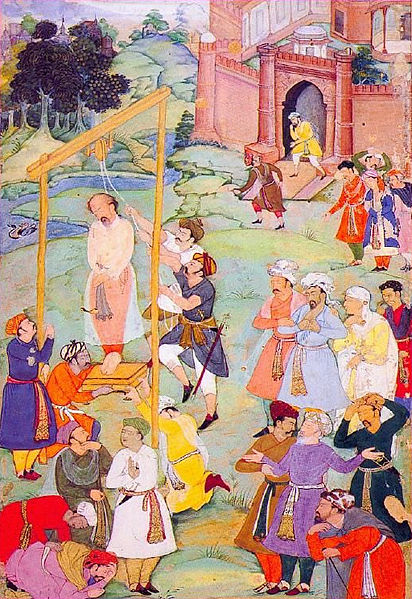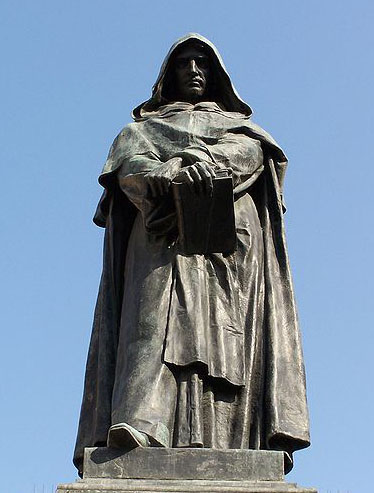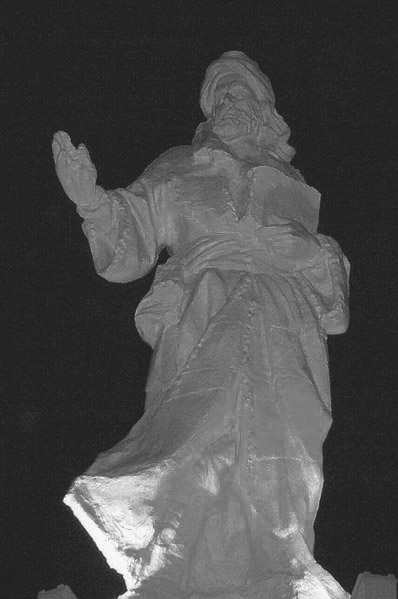
Many philosophers underwent suppression. The pages of history confirm that the suppression was carried out with the alliance of political and religious institutions. The execution of the Greek philosopher Socrates is the beginning of this hostile relationship with philosophy, particularly since we learn that the accusation levelled against Socrates was that he ‘corrupted the minds of the youth and promoted foreign gods’.
THIS IS FURTHER proof of the alliance between institutions of power and religion. The first institution covered itself with the charge ‘the corruption of the minds of the youth’ merely for the reason that Socrates was sowing in the minds of his audience the importance of free thought and not to yield to hearsay, and to refuse to believe any ‘immutable truths’ other than those you have examined. As for the charge of ‘promoting foreign gods’, this is a fabrication of the religious institution which insists on singularity and stands against diversity. The result being refusal to recognise other peoples’ beliefs.
Suppression continued until reaching its culmination in the Middle Ages in the East and the West. The suppression took several forms ranging from the rejection of the scientific inventor, such as took place with Copernicus and Galileo when they established that the Earth was simply a planet in the solar system. This contradicted what was contained in the books that the church leaders considered sacrosanct. Intellectual terrorism (a second form of oppression) reached the point of burning alive some of the philosophers at the stake, as happened with the scholar and philosopher Giordano Bruno, burnt by the pious priests in the square in Rome at the beginning of 1600 for merely having supported Copernicus and Galileo and having called on mankind to return to the faith of ancient Egypt for the tolerance and pluralism that it comprised (before the Akhenaton tragedy).
What took place in Europe was repeated during the Islamic caliphate. There are many examples of this but I consider the ugliest example of this is that which took place with Ibn al-Muqaffaʽ[1] and his friend ‘Abd al-Hamīd al-Kātib. During the period of the Abbasid caliphate ‘Abd al-Hamīd al-Kātib was condemned to be executed. Ibn al-Muqaffaʽ stood at his side and acted nobly when they each claimed that they were the ‘Abd al-Hamīd being identified. The guards took him off to a bestial death when he was slaughtered by the placing of a heated pan on his head. In order to prolong the torture the pan slowly burnt him until he expired. As for Ibn al-Muqaffaʽ, he wrote a treatise called Risāla al-Sahāba (a sincerely meant treatise on advice aiming at reform) in which he criticised the state fuqahā’ who were promoting the mechanism of absolute obedience to the Caliph and his court and maintained that the flock (what we would today term ‘the masses’) have no right to call the Caliph or his court to account. Having written the treatise he foolishly sent it to the Caliph Abū Jaʽfar al-Mansūr – an act of excessive daring to a caliph who considered himself ‘the Shadow of God extended upon the Earth’). Ibn al-Muqaffaʽ suffered his body torn limb from limb and had to watch while his members were cast into the fire.
The Islamic caliphate was caliphate of intellectual suppression
Incidents of enmity to all free thought follow one after the other, and we find Salāh al-Dīn al-Ayyūbī (Saladin) ordering his son al-Zāhir the Sultān of Aleppo to execute the philosopher al-Suhrawardī[2] for his simply having used symbolic language derived from ancient Persian wisdom and its counter-posing of light and darkness. Also executed was al-Hasan ibn Mansūr al-Hallāj (858-922) who was born in Persia and who promoted the ascetic life. He toured Turkestan and Makka and settled in Baghdad where he expounded his doctrine in the Kitāb al-Tawāsīn.
He maintained that it was possible to replace the five basic duties[3] with other beliefs (that is, the removal of intermediaries) and spoke of human union with the divine, to become the personal living evidence of God, and hence he said ‘I am the Truth’ and attempted to reconcile the faith with Greek philosophy on the basis of Sufi experience. He was accused of Disbelief and following a period of imprisonment lasting seven months the order was given for his execution. He was tied, beaten with whips, crucified, decapitated and his body burnt. Despite the unanimity of the magistrates concerning his Disbelief the common folk considered him a saint.
If the caliphs of the Arab / Islamic state suppressed philosophers to the point of executing them many of the doctors of law and Islamic historians participated in the crime when they accuse those who oppose their opinions of Disbelief. This is what happened to Ibn al-ʽArabī[4] the author of Al-Futūhāt al-Makkiyya and Tarjumān al-Ashwāq which provoked the fuqahā’ to accuse him of aberration and heresy. They claimed that he employed symbolism as a cloak to cover his anti-religious views, and was propagating aberrant doctrines on mystical union, divine indwelling and the unity of existence. Among those pronouncing him to be an infidel were Ibn Taymiyya, Ibn Khaldūn and Ibn Hajar al-ʽAsqalānī.
In the second century AH (the eighth century AD) a campaign by the caliph al-Mahdī was initiated against those who were termed zindīqs,[5] and the inquisitor ‘Abd al-Jabbār was commanded to arrest every one of them. Some of these were ordered to be executed and their books torn up. They were arrested for the merest suspicion and commanded to repudiate their views. If they did so they were released, if they refused they were put to death. Since some of them were followers of Manichaeans the caliphs forced them to spit on the image of Mani, and some historians note that the accusation of zandaqa was made for political reasons, in that the caliphs use this charge as a means to get rid of their Hashemite rivals. This is what the caliph al-Hādī did when he killed Dā’ūd ibn ʽAlī and Yaʽqūb ibn al-Fadl. The historian al-Tabarī[6] records that the accusation of zandaqa made against the vizier ‘Ubayd Allāh was intended to undermine his father’s influence with the caliph al-Mahdī. Instead of the caliph al-Ma’mūn occupying himself with improving the conditions of his subjects and working towards improving agricultural methods and the development of craft industries, he spent his time on debates with the Zindīqs, and should one of the poor wretches fail in his response to his argument he was ordered to be executed. The poet Bashshār ibn Burd[7] was charged with zandaqa for simply having made a defence of his national, Persian, culture and of his ancestors when he said:
Is there a Messenger who will tell all the Arabs of me,
Those who are alive and those buried in the dust,
That I am of lofty stock, more exalted than all others with a pedigree;
My grandfather in whom I glory was Chosroes, while my father was Sasan?
If the long arm of oppression reached philosophers and poets, it also reached the doctors of law themselves, as happened with Abū Hanīfa al-Nuʽmān for his having lent his support to the rebellion of Zayd ibn ʽAlī Zayn al-ʽĀbidīn against the Umayyad caliph Hishām ibn ʽAbd al-Malik the suppressor of the Umayyad ‘Alawis. Abū Hanīfa had issued a fatwa declaring the rebellion against the Umayyad king legally permissible. He was subjected to another ordeal when Ibn Hubayra proposed that he collaborate and issue a fatwa in his favour. Abū Hanīfa refused with the words:
How can I accept this task? You order people to be executed unjustly or for their goods to be confiscated. And I had to put my seal to this and the man be put to death and his goods confiscated? That will never be.
Whereupon Ibn Hubayra ordered him to be imprisoned and to receive daily ten lashings. The same thing was repeated with Ahmad ibn Hanbal for his ‘Creation of the Qur’ān’ and which ended with his ordeal of 28 months imprisonment during which time he was whipped into unconsciousness and felt nothing when he was pierced with a sword. Al-Jaʽd ibn Dirham, who claimed that the Qur’ān was created and not sempiternal was brought in chains to the mosque of Kufa by the Umayyad governor Khālid ibn ‘Abd Allāh al-Qasrī on the day of the ʽĪd al-Adhā. After praying and delivering a sermon he said at the end of his talk:
Go back to your homes and sacrifice; as many it is my wish to sacrifice Al-Jaʽd ibn Dirham, for he says that the Qur’ān is created and that Allah did not speak to Moses and did not take Abraham as his Beloved.
Whereupon he descended from the pulpit and slaughtered him by striking his head violently with the edge of a sword.
So it is no exaggeration to say that the Islamic caliphate was a bloody caliphate, a caliphate of intellectual suppression and one that was founded upon the plundering of the wealth of people whose lands they had occupied.
The role played by the Islamic religious priesthood continues to impose its views
The difference here is that Europe emancipated itself from intellectual terrorism and hostility to philosophy through serious resistance led by philosophers of the likes of Voltaire who wrote:
He who says to you “believe what I believe or else, God will curse you,” will not hesitate to say to you “believe what I believe or else I will kill you!”
The philosopher Kant writes that experimental phenomena or data in the field of space and time alone are the subject of human knowledge, whereas the divinity is not a subject of study. On the political level you find philosophers defending the necessity to make a complete separation between the three powers – the executive, legislative and legal. As a result of this intellectual struggle the role of the churches was neutralised and no longer had any authority over mundane life. It was the responsibility for humans to lay down laws governing their political, social and economic life.

Suggested Reading
As a result, Europe surged forward in scientific progress and in establishing the value of freedom, whereas the role played by the Islamic religious priesthood in the Arab states continues to impose its views to the present-day. For we see some of these excommunicating, now in the 21st century, those who maintain that the world is round[8], and others issuing fatwas against organ transplants, on the grounds that this acts to delay a human’s meeting with his Lord, and so on. As a result of this enmity to philosophy a well-known shaykh appeared on Egyptian television to issue an attack on Man’s going to the moon, citing the hadith as evidence. In the al-Azhari secondary school education syllabuses there features a condemnation of philosophy, in that the author equates philosophical treatises with books of sorcery. The result is a perpetuation of cultural backwardness. So it is my view that any Egyptian or Arab renaissance cannot take place until such time as we dispense with hostility to philosophy, and liberate scientific study from the domination of a religious priesthood that places obstacles and hindrances in the way, with the purpose of preventing the free mind striving towards a better human society.
[1] Ibn al-Muqaffaʽ (721-757 AD) was an Iranian thinker and litterateur who introduced Persian themes into literature and pioneered literary prose narratives, most famously in his translation Kalīla wa-Dimna. (Ed.)
[2] Shihāb al-Dīn Sohrevardī (1153-1191) was the founder of the Illuminationist philosophy, an important school in Islamic mysticism that drew upon Zoroastrian and Platonic ideas. In his Magnum opus titled “Oriental Theosophy” he thought of himself as a reviver or resuscitator icaor of ancient Persian wisdom tradition. (Ed.)
[3] These are: shahāda – (the declaration of faith); Salāh (prayer); Sawm (fasting); Zakāh (almsgiving) and Hajj (pilgrimage to Makka) (Ed.)
[4] Ibn Arabī (1165-1240 AD) was an Andalusian Sufi mystic and philosopher, known for his explanation of tawhīd (oneness of God) through the concept of wahdat al-wujūd (‘Oneness of being’). His largest (37-volume) work is al-Futūhāt al-Makkiyya (‘The Meccan Illuminations’) discusses a wide range of topics from mystical philosophy to Sufi practices and records of his dreams and visions. His work Tarjumān al-Ashwāq (‘The Interpreter of Desires ‘) caused consternation on the accusation writing erotic verses under the cover of poetic allusions expressing divine realities, forcing him to republish the work with a commentary explaining the meaning of the poetic symbols. (Ed.)
[5] ‘Skeptics’, ‘atheists’. See Glossary under ‘Zindīq’.
[6] Vol. III, 487.
[7] Bashshār ibn Burd (714-784 AD) was famous for his satirical works extolling the achievements of his Persian ancestors and denigrating the “uncivilized Arabs” whom he lampooned as ‘roasting skinks’ and ‘digging in the stony ground for lizards to eat.” He was condemned as a heretic and executed by the Caliph al-Mahdī. (Ed.)
[8] In a televised debate aired on Iraqi Al-Fayhaa TV (October 31, 2007), Muslim Researcher on Astronomy Fadhil Al-Saʽd declared that the Earth is flat as evidenced by Qur’ānic verses (cf. Qur’ān XV:19, XX:53, XLIII:10, L:7, LI:48, LXXI:19, LXXVIII:6, LXXIX:30, LXXXVIII:20 and XCI:6) and that the sun is much smaller than the Earth and revolves around it.(Ed.)
Main image: The execution of al-Hallāj from a medieval MSS


